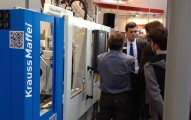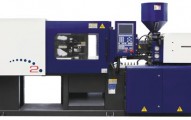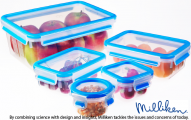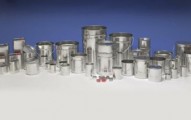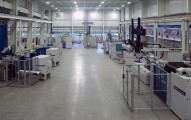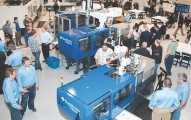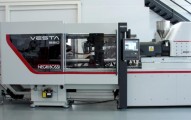IPF: Japanese Injection Machine OEMs Reduce the Pressure
Sumitomo Heavy Industries (Tokyo) adopted an interesting strategy at this year’s IPF near Tokyo. Rather than debuting a series of new machines, the injection press supplier decided to demonstrate just what’s possible with its existing line-up, in particular how clamping forces can be reduced through its “Zero-molding” technology.
The focus at IPF was on how Zero-molding can enable processors to reduce clamping pressure by up to 90%, enabling the use of large molds on smaller machines. One such machine on show was the SE130EV-HD, which was insert-molding a steering member with the aluminum insert having been treated with the NMT process from Taisei Plas. Sumitomo’s Flow Front Control (FFC) system is employed to minimize resin pressure and thus the required clamping force. The 130-tonne press was molding with a shot weight of 200 g of polyamide 6. “Previously the part would have required a 230-tonne machine,: says Takato Ochi, General Manager of the Global Sales and Marketing Group at Sumitomo.
The combination of FFC with the company’s SL screw design also minimizes gas generation according to Sumitomo. This is also reportedly beneficial for adhesion of the metal insert to the plastic.
In another example of clamping unit downsizing, Sumitomo showed how an air-conditioner louvre could be molded using 300 tonnes of clamping force on a 350UHDZ press rather than the 850-tonne press previously employed. Further, smooth filling with the FFS function reportedly eliminates warping of the flat part.
Sumitomo was not alone at IPF in promoting the benefits of reduced injection pressure. Nissei Plastic Industrial (Ueda, Japan) also jumped on the low pressure bandwagon with a low-pressure software application called N-SAPLI that reportedly enables molding precision parts with low-residual stress. In the demonstration at IPF, a polycarbonate (PC) lens was molded in a 118-second cycle with a shot weight of 117 g and thickness of 3 mm.
N-SAPLI reportedly improves internal stress of the molded products and gas release efficiency to reduce the occurrence of molding defects, such as sink mark, warping, and deformation. It was demonstrated on a Nissei FNX360 III-100A hybrid machine at IPF inside a mini clean room to showcase its clean operation capabilities. The Class 10,000 cleanroom on the show floor registered a particle count (>0.5 μm) of 707 per cubic foot that day.


